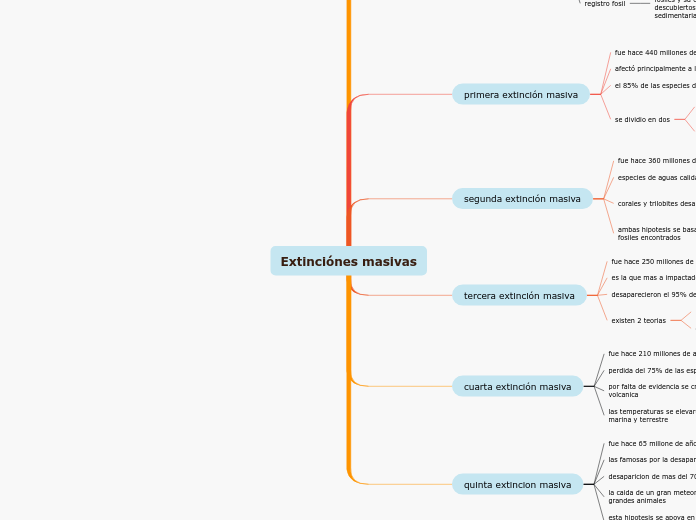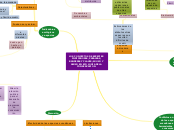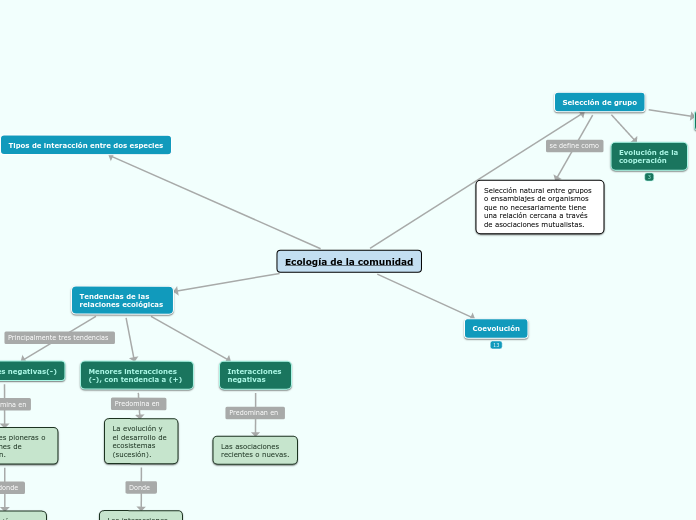Extinciónes masivas
To name your story, you have to think about the overall message and what you want your audience to understand from the story. Also, make it relevant and easy to remember.
quinta extincion masiva
esta hipotesis se apoya en el descubrimiento del crater de chicxulub, en yucatan
la caida de un gran meteorito termino con la vida de grandes animales
desaparicion de mas del 70% de las especies
las famosas por la desaparicion de los dinosaurios
fue hace 65 millone de años
cuarta extinción masiva
las temperaturas se elevaron tanto que afecto la vida marina y terrestre
por falta de evidencia se cree que hubo una erupcion volcanica
perdida del 75% de las especies
fue hace 210 millones de años
tercera extinción masiva
The ending of a story is essential. We all know that if the ending is weak, what happened before loses its importance. So make it unpredictable, but fair. A resolved ending answers all the questions and ties up any loose threads from the plot.
existen 2 teorias
erupcion volcanica
impacto de asteroide contra el planeta
desaparecieron el 95% de las especies
es la que mas a impactado en la vida en la tierra
This is the closure section of the story.
See examples of possible outcomes below:
- all problems have been solved
- it's clear how each one of your characters ends up
- your main character is transformed by the challenge
fue hace 250 millones de años
This is the moment when the main character surpasses the last obstacle and finally faces their greatest challenge.
The climax usually follows one of these patterns:
- realization
- resolution
- choice
Type in your answer.
segunda extinción masiva
The middle of the story is where you add layers of complications that will lead to the end. Reveal more about the character's journey. Did their personality go through changes? How did they overcome the challenges? And as you build up the story’s central conflict, make it more personal to that character. Also, from the middle act, you have to lead into the final act.
ambas hipotesis se basan en la gran cantidad de fosiles encontrados
corales y trilobites desaparecieron
There wouldn't be any tension and excitement in your story if there weren't any obstacles in your character's way.
colision de continmentes
caida de meteorito
especies de aguas calidas las mas afectadas
Your character(s) need(s) motivation in order to solve the challenge(s).
fue hace 360 millones de años
Each story has a main character and that character usually needs to solve a problem or challenge. The character's challenge is the one that creates tension throughout the story.
primera extinción masiva
In the beginning of the story (or the exposition), you will need to introduce the setting and characters. You might also want to introduce the main conflict. This part of the story is important because it gives the reader necessary background information and maybe even a first insight into a character’s personality.
se dividio en dos
finalizacion de glaciar por el hundimiento de los mismos, aumenta el nivel del mar.
inicio glaciacion en donde se formaron grandes glaciares
el 85% de las especies desaparecieron
afectó principalmente a la vida marina
The setting (time & place) of a story can change throughout the plot.
fue hace 440 millones de años
Characters are essential to a good story. Usually, the protagonist(s) is/are the most affected by the plot. Introduce a character by focusing on their actions, interests, and occupation, as the physical appearance doesn't make a difference in most cases.
deriva continental
registro fosil
incluye a todos los hallazgos documentados de fósiles y su ocurrencia, así como los que aún serán descubiertos y descritos, contenidos en las rocas sedimentarias.
La Deriva Continental se refiere a la hipótesis, acreditada al meteorólogo alemán Alfred Wegener, y publicada en 1915 en su obra “The Origin of Continents and Oceans” (el origen de los continentes y océanos), donde plantea que durante el final del periodo Paleozoico y el principio del periodo Mesozoico










